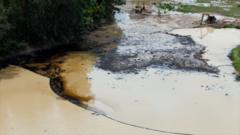A whistleblower has brought to light alarming pollution levels caused by Ecopetrol, Colombia's state-owned oil company. An investigation reveals that the company has reported numerous unresolved environmental disasters affecting vital water systems and endangered wildlife. Despite Ecopetrol’s assurances of adherence to sustainability practices, evidence suggests a long history of pollution and suppression of information, culminating in threats against those who dare to speak out.
Whistleblower Exposes Environmental Abuses by Colombian Oil Giant Ecopetrol

Whistleblower Exposes Environmental Abuses by Colombian Oil Giant Ecopetrol
Leaked data reveals extensive oil pollution from Ecopetrol poses severe risks to Colombia's biodiversity and water sources, challenging the company's public sustainability claims.
Ecopetrol, the Colombian state-owned oil giant, is facing serious allegations of widespread environmental violations, as a whistleblower has released internal data highlighting the company’s polluting practices. An investigation by the BBC World Service has unveiled that Ecopetrol has contaminated more than 800 sites across Colombia, including crucial water supplies and diverse wetlands. The leaked records, spanning from 1989 to 2018, point to the company’s failure to disclose approximately 20% of these pollution incidents.
The company's main refinery, located in Barrancabermeja, has been implicated in the pollution of the Magdalena River, which supplies millions with water. Fisherfolk in the area have reported noticing an unsettling change in local wildlife, with evidence of oil pollution affecting fish and other species. One fisherman revealed that fish they caught emitted a strong smell of crude oil, while distinct iridescent films were visible on the water's surface.
Ecopetrol has consistently claimed adherence to Colombian environmental regulations and boasts industry-leading sustainability measures. However, claims from local fishing communities and the whistleblower, Andrés Olarte, have pointed to a troubling pattern of concealment regarding pollution data, suggesting that the company may have actively attempted to hide some incidents from authorities. This is reinforced by a database from 2019, naming 839 "unresolved environmental impacts," many of which remained contaminated for years.
Despite the significant evidence presented, including thousands of reported oil spills since 2020, former CEO Felipe Bayón denied any intentional obfuscation of facts, attributing many spills to external sabotage. In interviews, he also claimed progress in addressing pollution issues.
Yet the more recent data corroborated by Colombia's environmental agency, ANLA, contradicts these assertions, showcasing continuing contamination in the Barrancabermeja area where several dead animals, including endangered species, have been discovered.
The whistleblower, Olarte, faced intimidation actions following his departure from Ecopetrol, including anonymous death threats. His activism highlights the extreme risks environmental defenders face in Colombia, a country noted for being the most dangerous globally for such advocates, with numerous documented killings.
Despite the dangers, community leaders like Yuly Velásquez remain resolute in voicing concerns about the ecological disasters threatening their livelihoods. As Aquaculture experts assess the dire consequences of these pollution levels, both Olarte and Velásquez continue to call for accountability in light of a complex nexus of energy needs and environmental stewardship. As Colombian society navigates the tension between economic growth and ecological preservation, the revelations around Ecopetrol could herald significant changes in industry practices amidst growing public scrutiny.



















